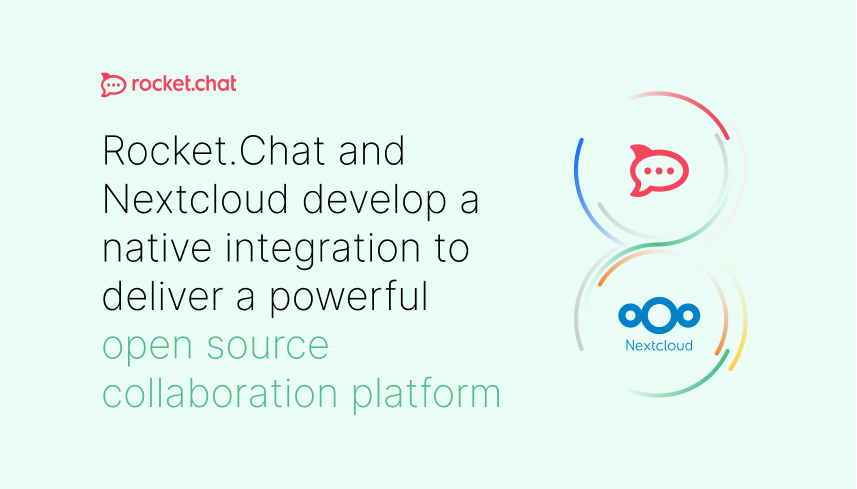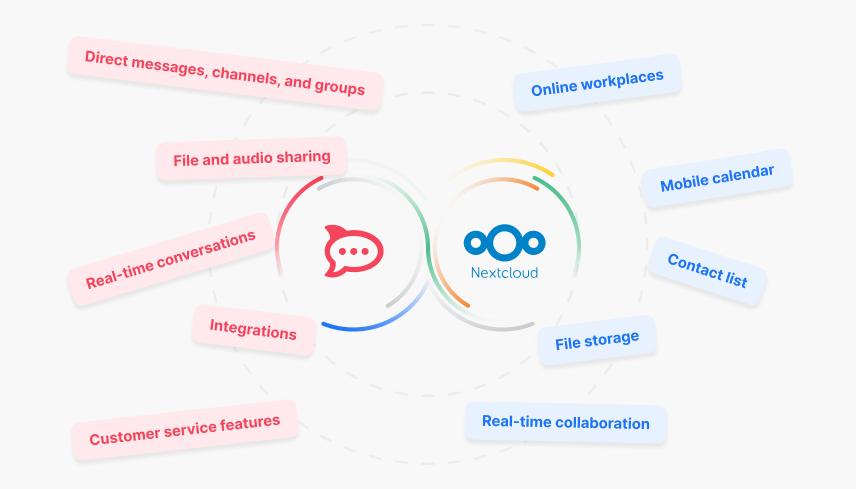Originally published at: https://nextcloud.com/blog/rocket-chat-nextcloud-integration/
EDIT: we’re organizing a webinar on Thursday April 21st at 5PM CEST to discuss the improved integration that has been developed!

We are pleased to announce a new and improved integration to the Nextcloud ecosystem with Rocket.Chat! As our users know, our platform comes with Nextcloud Talk, a deeply integrated audio and video chat platform. However, we also love working with other chat platforms. For instance, one previous integration we’ve done is with Big Blue Button. Their web conferencing system is used by schools and universities and focuses on such one-to-many presentations instead of collaborative working, as shown in this video. Furthermore, almost four years ago, we introduced a basic integration with Rocket.Chat, and today we are partnering up again for an even bigger integration.
Nextcloud and Rocket.Chat share a common mission – providing the best digital collaboration tools, and keeping data private. That’s why we’ve decided to team up again and provide users of both our solutions with an intuitive, integrated user experience.
The Nextcloud-Rocket.Chat native API integration features more choice and functionalities.

We at Nextcloud are pleased to announce our latest newcomer to the Nextcloud ecosystem, Rocket.Chat!
Not only does Rocket.Chat have a chat area similar to Nextcloud Talk, but its federations and governance capabilities extend into Nextcloud’s comprehensive digital working environment. For example, you’re now able to streamline communication with external parties using Rocket.Chat’s federation and bridges into Slack and Microsoft Teams.
Rocket.Chat is an open-source communication platform that puts data privacy, security, and data sovereignty first. It is the ultimate self-managed alternative to solutions such as Slack and Microsoft Teams. Its integrations with Whatsapp, Twitter, Messenger, Email, Telegram, and other channels enable better customer service, and the in-app chat API is used to build powerful chat solutions inside any application.
As a Nextcloud user, you can install Rocket.Chat for another way to chat with colleagues, customers, and companies. Finally, there’s a single platform with all the tools you need to stay productive and keep business communications in one place.
Other great reasons to use the new integration:
-
Ensure full governance of all conversations using message audits, flexible retention policies, powerful engagement analytics and dashboards, and more
-
Leverage more advanced user governance features, access levels, and role-based permissions
-
Easily map even the most complex organizational structure into groups, teams, and discussions
We are proud of our mutual dedication regarding data privacy. Since both our foundings, data security has been our top priority and we enable our users to achieve digital sovereignty. As we are both open-source companies, we enable you full access to our mutual code bases. Now, you can be even more productive and achieve your goals with both Rocket.Chat and Nextcloud.
Intrigued? The Rocket.Chat app is now available on Nextcloud’s Marketplace.
